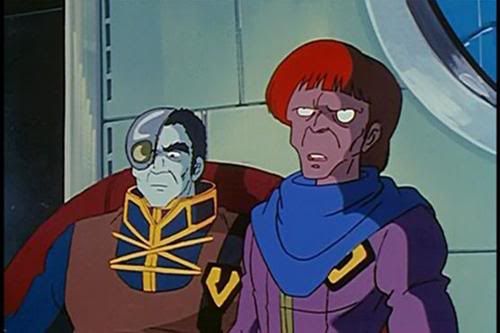
Starting in 2008, I grew obsessed with an obscure aspect of Japanese animation, finding within it a certain peculiar personal resonance that makes sense to me, but is odd in comparison to what else has sprung up in relation.
Zentradi (Zehnt-RAW-Dee) (also written as “Zentraedi”) first appeared in the 1982 science fiction anime series Super Dimension Fortress Macross (MACK-ross). They are a race of genetically engineered alien beings who, due to various circumstances, look like humans and are genetically compatible with them. They have been conditioned to form a solely military force, and though created as giants, they are capable of reverting to human size.
In the Macross plotline, a segment of the Zentradi, through contact with humanity, discover that there are other aspects to living besides war, and eventually decide to lay down their arms to begin a new life for themselves, allying with humanity against a larger Zentradi authority.
Much of that initial Zentradi story arc revolves around a male Zentradi fleet’s fascination with the singing of pop superstar Lynn Minmay, but there are many other factors which drive this change, even though adjusting isn’t always easy. It is a movement portrayed with an odd combination of humour and earnestness, which gives it a poignant as well as comical aspect.
SDF Macross then was dubbed as the first segment of Robotech, a TV series consisting of this and two other unrelated anime series, redubbed as if they were presenting generations of a single universe’s timeline. Robotech aired on American TV in the 1980s, and is now mostly forgotten, except as a nostalgia piece. However, a chance encounter with Robotech is what allowed me to discover the Zentradi, and that series has turned out to have a very large influence on the direction my interest in them took.
SPACE: The Imagination Station, the Canadian equivalent to the former Sci-Fi Channel, started running Robotech in January of 2008, in what seemed to be part of a desperate bid to create interest in the comatose franchise. When this happened, I’d already been an anime fan for quite a while, and wasn’t in need of Robotech as a gateway to “real” anime as it was for Gen X. But I knew what Robotech was, and, curious about the series’ presentation, I watched it when it came on.
(Plus, it had giant robots in it; you can never, ever go wrong with giant robots)
Of course, it was actually impossible to evaluate Robotech on its effectiveness as a chimera series, given that I went into it already knowing where it came from. Despite this, I started an sincere involvement with its story, only backtracking later into the more expected anime geek cynicism.
This incident defines the term “coincidence”. Given that they first debuted almost thirty years ago, it still surprises me to remember that the Zentradi were something that I had avoided finding until well into my anime game. Yet just reading about what happens to them isn’t enough to excite interest or even confidence: their storyline seems like a standard one at first blush, and essentially it is. Thus, I might not ever have bothered with Macross unless I found a free and easy way to access some version of it.
However, once I got into it, I found that the Zentradi story appealed to certain personal ideals. I became largely absorbed with a certain group of Zentradi characters and one in particular; those ended up defining my interest in their race as a whole, and provided me with a strong emotional connection to the themes of Macross. However, I almost completely lacked interest in any other aspect of the storyline around the Zentradi. I could say reasonably intelligent things about the actual main characters, the human love triangle, and the hero’s growth pattern which together formed the true heart of Super Dimensional Fortress Macross, but that wasn’t what I was truly attached to.
Knowing this, I use the term “personal fandom” to describe my little bubble of Zentradi geekdom, one inside which my levels of enthusiasm are not mediated by the characters’ actual prominence in the narrative, the larger fandom, official canonicity, and the truths related to that.
Such a “personal fandom” ended up getting me into trouble, when I saw that various incarnations of the Zentradi never quite took them in the direction that I wanted. This, at least, gives me plenty to talk about, and I will be discussing the nature of all of this in the following essay.

No comments:
Post a Comment